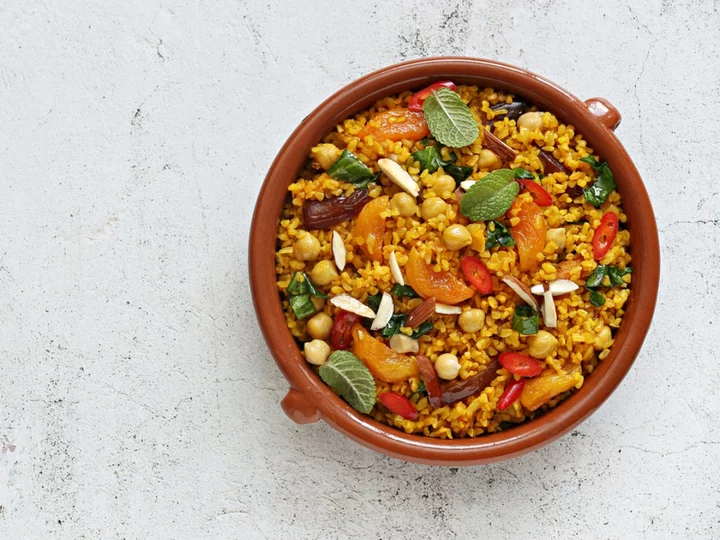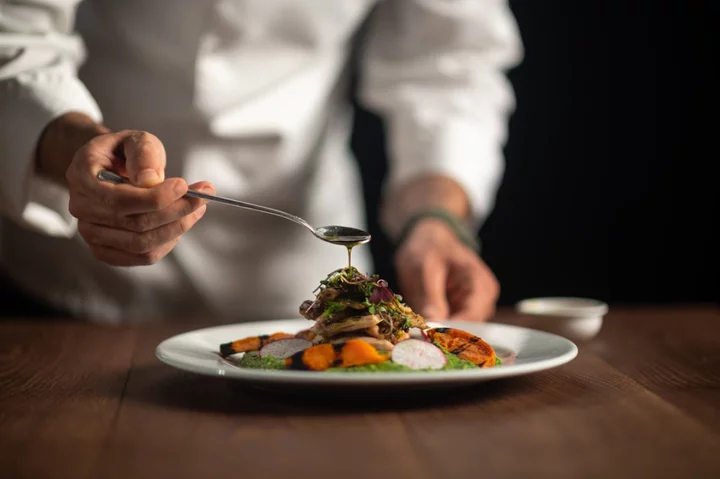
The bowel cancer symptom George Alagiah wished he’d caught earlier
BBC presenter George Alagiah has died at the age of 67, after nearly a decade of living with bowel cancer. The newsreader was first diagnosed in 2014. He underwent several rounds of treatment after the cancer returned and spread over the last few years. In a statement, his agent Mary Greenham said: “George fought until the bitter end but sadly that battle ended earlier today. George was deeply loved by everybody who knew him, whether it was a friend, a colleague or a member of the public. “He simply was a wonderful human being. My thoughts are with Fran, the boys and his wider family.” Earlier this year, Alagiah opened up about a symptom he wished he had caught earlier. He was taking part in an NHS campaign to encourage the wider public to take up its bowel cancer screening program. He urged people who have received a free test kit from the health service “not to ignore it” because it “could save your life”. “Had I been screened, I could have been picked up. I would have been screened at least three times and possibly four by the time I was 58 and this would have been caught at the stage of a little polyp: snip, snip,” he said at the time. Alagiah received his diagnosis after complaining of blood in his stools. He underwent 17 rounds of chemotherapy and five operations to treat the disease, which eventually spread to his liver and lymph nodes. He supported a campaign by Bowel Cancer UK and Beating Bowel Cancer to make cancer screening available to everyone in England from the age of 50. Currently, screening is available to everyone aged 60 to 74, but the NHS is expanding to include everyone aged 50 to 59 years old. Around 42,000 people are diagnosed with bowel cancer every year in the UK, with 90 per cent of diagnoses made in people over the age of 50. It the fourth most common cancer and the second biggest cancer killer, leading to around 16,800 deaths every year. The three main symptoms of bowel cancer include having persistent blood in the stools; an ondoing change in bowel habits, such as needing to go more often or having diarrhoea; and persistent lower abdominal pain, bloating or discomfort. Some patients may also experience a loss of appetite, or significant, unintentional weight loss. According to Cancer Research UK, another potential symptom is tenesmus, which is the feeling of having to defecate without having stools, or experiencing pain upon defecation. Studies have found that several factors could potentially increase the risk of bowel cancer, although they cannot explain every case. These include a diet high in red or processed meats and low in fibre; being overweight or obese; not exercising often enough; and drinking too much alcohol. Smoking and having a family history of the disease can also increase the risk. Some people with long-term conditions like extensive ulcerative colitis or Crohn’s disease may also have an increased risk of bowel cancer. Bowel cancer can be treated with surgery, which may be paired with chemotherapy, radiotherapy or biological treatments. Catching the cancer at an early stage greatly improves chances of survival. However, the NHS states that if a cancerous tumour cannot be removed completely through surgery, then a cure may not be possible. For more information about treatment for bowel cancer, visit the NHS here and Cancer Research UK here. To speak to a Cancer Research UK nurse, you can call 0808 800 4040. The helpline is free and open from Monday to Friday, from 9am until 5pm. Additional reporting by PA Read More George Alagiah death: BBC newsreader dies aged 67 after bowel cancer diagnosis ‘One of the best and bravest’: George Alagiah obituary as long-serving BBC newsreader passes away ‘It’s not the doom and gloom you might think’: Jonnie Irwin details experience with palliative hospice care
1970-01-01 08:00

George Alagiah: What are the signs of bowel cancer?
BBC newsreader George Alagiah has died at 67 after being diagnosed with bowel cancer. Bowel cancer is the fourth most common cancer in the UK and leads to around 16,800 deaths every year. More than nine out of 10 cases of bowel cancer develop in older adults over the age of 50, and nearly six in 10 are in people aged 70 or older. Alagiah was first diagnosed with stage four (advanced) bowel cancer in 2014. By the age of 66, it had spread to his lungs, liver, spine and lymph nodes. The three main symptoms of bowel cancer are having persistent blood in the stools, an ongoing change in bowel habit (such as needing to go more often or suffering the runs) and persistent lower abdominal pain, bloating or discomfort. A loss of appetite may also occur, or somebody may suffer significant, unintentional weight loss. Several things are known to increase the risk of bowel cancer, though they cannot explain every case. These include a diet high in red or processed meats and low in fibre, being overweight or obese, not taking enough exercise and drinking too much alcohol. Being a smoker and having a family history of the disease can also push up the risk. Some people also have an increased risk of bowel cancer because they have another long-term condition, such as extensive ulcerative colitis or Crohn’s disease. Bowel cancer screening is currently widely offered to people aged 60 to 74 who are sent a home stool kit every two years. Those aged 75 and over can ask for a kit every two years by phoning the free bowel cancer screening helpline on 0800 707 60 60. Bowel cancer can be very difficult to treat in its later stages. But in the early stages, tumours can often be removed through surgery. The main treatments for bowel cancer include chemotherapy, radiotherapy and targeted drugs, which depend on the genetic make-up of the tumour. One in 15 men and one in 18 women will be diagnosed with bowel cancer during their lifetime. Expert predictions are that 53,646 cases of bowel cancer (29,356 in men and 24,290 in women) will be diagnosed in the UK in 2035. Read More Charity boss speaks out over ‘traumatic’ encounter with royal aide Ukraine war’s heaviest fight rages in east - follow live Carol Vorderman says she no longer sunbathes after health scare Carol Vorderman: Why my skin cancer scare means I no longer sunbathe This is how often you should actually change your razor
1970-01-01 08:00

The new 'private jet'-style airline flying to the Maldives
Beond is a new all-business class airline to the Maldives, based in capital Malé. Launching from Dubai and Delhi, with plans to expand to Europe, it promises lie-flat beds and a "private jet" experience.
1970-01-01 08:00

Mum’s husband fired from family business after she roleplayed with reborn dolls
A woman who turned to roleplaying with hyper-realistic dolls “to help (her) cope” with the death of her first baby – and continues to do so with her husband and two rainbow babies – has said her husband’s parents disapproved of the hobby and fired him from the family business as a result. Christina Keeler, 38, a stay-at-home mum and YouTuber, from Wyalusing, Pennsylvania, USA, fell pregnant with her first “miracle” baby in 2015, despite having endometriosis and being told she would not be able to conceive in her 20s. She suffered a miscarriage, but after watching a documentary about so-called reborn dolls, she had a “lightbulb moment” and realised getting a hyper-realistic doll would be the “perfect solution”. Christina’s husband Bill, 43, was “hesitant” at first but became supportive after he saw how much it “helped (her) grief”. The couple went on to have two “miracle” daughters, Grace, six, and Joy, four, who now help feed, change and dress the family’s five reborn dolls – which cost between £1,560 and £3,899 each – in their “nursery” complete with “a crib and a wardrobe”. The family often take the dolls out in public, and have shared their journey on YouTube – where Christina documents people’s reactions to her dolls and birthing videos. Some silicone dolls come in a fake womb which allows a Caesarean section to be performed at home. But Bill’s family were “disgusted” with the hobby, to the point where they gave him a choice to stop having the dolls or leave the family business. He refused to shut down the YouTube channel and did not want Christina to give up her hobby, so he was fired. She fell pregnant with her first baby in 2015, a year after her mother died of cancer. The couple were “elated” about the pregnancy because Christina had been told in her twenties that she would not be able to conceive because she has endometriosis, but she miscarried at eight weeks. Christina told PA Real Life: “When we lost the baby it was so devastating, I remember lying in the hospital bed after they had taken the baby out of my belly, and screaming for my mum and wept wanting to cuddle my baby.” She “really struggled” with the grief of losing her mother and her baby so close together. She explained: “This feeling of sorrow just never went away, it was so painful that I never talked about it again.” Despite having her two “miracle” children Grace and Joy, Christina still longed to hold her first baby, and after watching a documentary about reborn dolls, she wanted to get one to see if it would help her grief. She said: “I felt so blessed to have two healthy girls, but that feeling of missing the first baby never quite went away. “When my youngest was around two years old, my husband and I came across a documentary about reborn dolls. “And he was like, ‘That’s really weird’, and I played it off that I thought the same, but actually I really wanted one to help me cope and I thought it would be the perfect solution.” After persuading her husband, Christina ordered her first lifelike doll, Hannah, costing her around £155. She said: “I told my husband and he was not on board at all, he was hesitant, but after explaining my reasoning, he was much more understanding and more accepting.” When the doll arrived, Christina instantly felt like it helped with her mourning. She said: “It helped me therapeutically because for the first time ever when I got my first reborn doll, I was able to talk about the loss of our baby. “And since then I have healed tremendously from that loss because I’m able to talk about it and share my story and help others – it helped my grief, for sure.” Christina now has a collection of five dolls called Carter, Cadence, Quinn, Isabella and Sammy, which she loves to dress, cuddle and feed. She takes the dolls out in public and people often mistake them for real babies. She said: “We have a nursery for them with a crib and a wardrobe. I check on them throughout the day, and on other days, especially when the girls want to get involved, I pick out an outfit for them, bring them to breakfast, get them to feed them a bottle, change them. “If we’re running errands we often take them out with us and put them in a car seat and stroller.” Christina and her family have been sharing their experiences on YouTube, where they are known as The Reborn Family. She said: “I make videos about people’s reactions to my dolls, as well as vlogs and birthing videos – I have some silicone reborn dolls which come in a womb and you perform a C-section on it at home, to give birth to the baby.” Despite her immediate family being supportive of the hobby, Christina admits not everyone in her wider family understands. She said: “My husband’s family were, and still are, disapproving of the reborns, even though they can see how much they helped me. They were disgusted. “We moved from California to Pennsylvania because my husband was next in line to take over the family business because they were about to retire, and they asked if we would like to do so and we agreed. “When they were on vacation they came across our YouTube channel, and they called us up and they were mortified and so embarrassed, and said we were ruining the family name.” When Bill’s parents came home, they gave him an ultimatum to stop having the dolls. Christina explained: “Bill said that he was not going to quit his job, and didn’t want me to stop having reborns because they were so therapeutic for me at the time, and his dad said, ‘Well, then you’re fired’.” My husband’s family were disgusted, they said we were ruining the family name Bill’s father was contacted by PA Real Life for comment, but he had not responded at the time of publication. Even though her reborns have caused tension in the family, Christina cannot see herself giving up her hobby any time soon. She said: “Reborns continue to help me with my grief, and I love sharing content with other people who have lost babies, and they can also really help people with dementia, people who are infertile, people with anxiety and depression, I wouldn’t want to stop this.” Read More Teenager who thought she was pregnant diagnosed with ovarian cancer Woman praised for response to parents who asked her to swap first class seat with their child Barbie vs Oppenheimer: Greta Gerwig makes history with biggest box office opening for a female director Charity boss speaks out over ‘traumatic’ encounter with royal aide Ukraine war’s heaviest fight rages in east - follow live
1970-01-01 08:00

Teenager who thought she was pregnant diagnosed with ovarian cancer
A teenager who thought she was pregnant after her stomach unexpectedly became rounder, and who was told it was constipation by her GP, was later diagnosed with ovarian cancer and is now a student nurse after realising “life is too short”. Summer Edwards, 22, a student nurse at the University of the West of England, from Bristol, went from a size six to size 10 “in a matter of weeks” and thought she was pregnant in 2020, but her GP reassured her that it was constipation. After trying strong doses of laxatives and having two catheters fitted, nothing improved, and she was eventually diagnosed with an ovarian cyst which doctors were able to remove successfully. However doctors then found an extremely rare 19cm by 17cm tumour and Summer was diagnosed with stage one ovarian cancer. Summer had keyhole surgery to remove it, which was a success, but she also found out she had a rare gene, DICER1, which meant she was more susceptible to other types of cancer. Six members of her family have since been diagnosed with the gene, including her 16-year-old cousin who now has lung cancer, but Summer says she is a “fighter”. Since Summer was diagnosed with cancer she has been training as a student nurse, which is something she has “always” wanted to do. In May 2020, at the age of 18, while working in a hospital as a healthcare assistant, Summer began to notice her stomach was getting rounder, but put it down to eating a few extra treats at work. She said: “My mum was convinced I was pregnant, and I began to believe it, but I took a pregnancy test and it came back negative. “I went from a size six to size 10 in a matter of weeks, and one day I was in the garden in a bikini and my mum said that she thought something was really wrong because my stomach was really round.” To reassure her mum, Summer went to her GP and was prescribed a strong dose of laxatives, as they thought she was constipated. But after two weeks of taking the medication nothing changed, so Summer was called in to her GP surgery. Summer said: “The doctor felt my stomach and they said something was not right, but I didn’t think much of it.” Summer also had blood tests, and spotted that her blood was being run for a CA-125 test, a tumour marker for ovarian cancer, and a few days later was asked to have an internal ultrasound, where she was told her bladder was “completely full” with more than a litre of urine. Doctors told Summer there was “nothing they could do at that point” so, after asking her doctor friend for advice, she went straight to A&E and had a catheter fitted. She said: “I was devastated, I was only 18 and I really didn’t want to be walking around with a catheter strapped to my leg or be signed off work for 12 weeks.” After a few days of being catheterised, Summer continued urinating as usual, so she returned to the hospital and had another fitted. But the following day she began experiencing a great deal of pain. She said: “It was weird, I went to the toilet and I noticed a lot of blood in the bag, and I was still weeing. “I was taken into hospital – at this point, I was screaming in pain.” Summer then had a CT scan, and it was found that her bladder was never full – instead, she had a large ovarian cyst which was successfully removed with surgery. But two weeks later Summer went for her post-operation check-up and was told she had a 19cm by 17cm tumour. She said: “They told me I had a Sertoli-Leydig cell tumour, which was really rare. “They told me there was only one other person in the UK that had it at that point and my blood tests came back fine on the CA-125 marker because it causes a boost in testosterone so didn’t show as a marker. “It didn’t sink in at all, and the first thing I did was take my sick note to work – I was gutted I couldn’t work. “When I told people there, they cried, so I did too, but it didn’t hit me for a while.” On July 1 2020 Summer had a hospital appointment to find out more about her tumour, and to her devastation she found out she had ovarian cancer. She said: “They explained more about my tumour, and that there have not been any clinical trials for it because it’s so rare. “I put it bluntly and asked them if I had cancer and they said yes. “My mum was upset about it more than me – I think it’s more scary for those around you.” About two weeks later Summer had keyhole surgery to remove the tumour, which was a success. She said: “I was so relieved, and in my post-op review they asked me if I wanted preventive chemotherapy and I said no, as the pros outweigh the cons for me. “I’d rather live my life now and deal with chemotherapy in the future if it ever comes back.” Since then Summer has had internal ultrasounds every three months, which will continue for the next ten years. She has also been genetically tested, and she was diagnosed with DICER1 syndrome – an inherited disorder that increases the risk of cancerous tumours, most commonly in the lungs, kidneys, ovaries and thyroid. Summer said: “I now know that if I have kids, they will probably have the gene, and I’ve looked into IVF and PGD (preimplantation genetic diagnosis) but there is no licence to test for DICER1, I’d have to go and ask for one to be made. “I know that I’m probably more likely to get another type of cancer in the future too.” Summer’s immediate family tested negative for the gene, but when Summer’s aunt came to one of her appointments with her, she believed her daughter, Summer’s 16-year-old cousin, had the gene. Summer said: “After tests, my aunt and five of her children have the gene, and one of them has lung cancer but she’s a fighter.” Now Summer is a student nurse – she has “always wanted” to work in healthcare, and has been doing so since she was 17, but when she received her cancer diagnosis it pushed her to apply for university. She said: “My tutors are amazing and I have had time off for scans and things, but I absolutely love it. “Having the diagnosis made me realise there’s no time to wait and life is too short.” For more information, visit: targetovariancancer.org.uk/ or www.nhs.uk/conditions/ovarian-cancer/. Read More Teenager who thought she was pregnant diagnosed with ovarian cancer Jonnie Irwin details experience with palliative hospice care Carol Vorderman shares warning to sunbathers after skin cancer scare Jonnie Irwin details experience with palliative hospice care Carol Vorderman shares warning to sunbathers after skin cancer scare This is how often you should actually change your razor
1970-01-01 08:00

Barbenheimer gave Vue cinemas the best UK weekend since Covid
Barbie and Oppenheimer did so well at the box office at their opening weekend that Vue International reported its biggest weekend for UK cinema ticket sales since before the pandemic. On Sunday, the cinema chain said a fifth of its customers had bought tickets to see both films in a double bill. More than 2,000 of Vue’s screenings for Barbie were sold out, according to the company. The company said the comedy drama Barbie, starring Margot Robbie and Ryan Gosling, would exceed ticket sales for Super Mario Bros and expected Oppenheimer to become the biggest film of the year. Tim Richards, chief executive and founder of Vue International, said: “Vue saw its highest weekend admissions since Avengers: Endgame in 2019 with the release of Barbie and Oppenheimer, proving that when the movies are there our customers will come to watch them on the big screen. Sign up to our free Indy100 weekly newsletter “Barbie is tracking to become the biggest film of 2023 and has a good chance of getting into the Top 10 highest grossing films of all time. “It is an incredibly exciting moment for the industry, and we expect this trend to continue for the coming weeks.” In total, the cinema chain had more than 4,000 sell-out sessions across the country for both films. Meanwhile, Odeon reported on Thursday that more than 200,000 advance tickets had been bought and more than 10,000 guests were expected to see both films during the opening weekend. Universal Pictures said Oppenheimer had made £8.05m in the UK and Ireland since Friday. They said the biopic is on track to have a better opening three days than Nolan’s other blockbusters Dunkirk, Interstellar and Inception. Have your say in our news democracy. Click the upvote icon at the top of the page to help raise this article through the indy100 rankings.
1970-01-01 08:00

Five dinner ideas from around the world to try this week
Sometimes dinnertime is not just about satisfying our hunger. It’s a chance to embark on a culinary adventure from the comfort of our homes. To elevate your dining experience this week, we’ve curated a selection of five diverse and sustainable dinner recipes that celebrate global powerhouses of flavour while keeping an eye on our ecological footprint. Transport yourself to the bustling markets of Morocco with an aromatic vegetarian taigne. Embracing the harvest of the season, this hearty dish brings together the earthiness of butternut squash and carrots with the protein-packed goodness of chickpeas. Topped with a zesty lemon-dill sauce, the baked salmon dish below offers a refreshing twist to your taste buds while delivering a dose of healthy omega-3 fatty acids. A true taste of British comfort, a classic beef and mushroom pie is a hearty masterpiece that showcases locally sourced beef. The recipe also minimises waste and maximises taste, making it an economical choice for families. Capturing the vibrant colours of the Mediterranean, stuffed peppers are a celebration of wholesome and vegetarian goodness. Filled with couscous, chickpeas and a medley of vegetables, this dish burts with nutritious delights. Lastly, journey to the aromatic landscapes of Thailand with a tantalising green curry. Tender chicken thighs dance harmoniously with fresh vegetables, bathed in a luscious coconut curry sauce. Bon appétit! Spiced vegetable tagine This Moroccan-inspired vegetarian tagine is bursting with flavour from seasonal vegetables and aromatic spices. It’s perfect for a cosy dinner and packed with nutritious goodness. Serves: 4 Prep time: 15 minutes | Cooking time: 1 hour Ingredients: 2 tbsp olive oil 1 large onion, finely chopped 3 garlic cloves, minced 2 tsp ground cumin 1 tsp ground coriander 1 tsp ground cinnamon ½ tsp ground ginger 1 butternut squash, peeled and diced 2 carrots, peeled and sliced 1 tin (400g) chickpeas, drained and rinsed 1 tin (400g) chopped tomatoes 500ml vegetable broth 100g dried apricots, chopped Salt and pepper to taste Fresh coriander leaves for garnish Method: 1. Heat the olive oil in a large pot over medium heat. Add the chopped onion and garlic, sauté until softened. 2. Stir in the ground cumin, coriander, cinnamon, and ginger. Cook for another minute until fragrant. 3. Add the butternut squash and carrots, tossing them with the spices. 4. Pour in the chickpeas, diced tomatoes, vegetable broth, and chopped apricots. Season with salt and pepper. 5. Bring the mixture to a boil, then reduce the heat to low, cover the pot, and let it simmer for about 1 hour or until the vegetables are tender. 6. Serve the tagine over couscous or rice, and garnish with fresh coriander leaves. Baked salmon with lemon-dill sauce This delicious and sustainable salmon dish is baked to perfection and served with a zesty lemon-dill sauce. It’s a delightful dinner that’s easy to prepare and full of omega-3 fatty acids. Serves: 2 Prep time: 5 minutes | Cooking time: 20 minutes Ingredients: 2 salmon fillets 1 tbsp olive oil 1 lemon, thinly sliced Salt and pepper to taste ¼ cup (60g) plain yogurt 1 tbsp fresh dill, chopped 1 tsp lemon zest 1 tsp lemon juice Method: 1. Preheat the oven to 200C (180C fan). Grease a baking dish with olive oil. 2. Place the salmon fillets in the baking dish. Season with salt and pepper, then lay lemon slices on top of each fillet. 3. Bake the salmon for 15-20 minutes or until it flakes easily with a fork. 4. While the salmon is baking, prepare the lemon-dill sauce. In a small bowl, mix together the plain yogurt, fresh dill, lemon zest, and lemon juice. 5. Serve the baked salmon with the lemon-dill sauce drizzled on top. Beef and mushroom pie This classic British beef and mushroom pie is a comforting and hearty dish, perfect for a family dinner. The tender beef and earthy mushrooms are enveloped in a rich gravy, all wrapped in a flaky pastry. Serves: 6 Prep time: 20 minutes | Cooking time: 2 hours Ingredients: 500g beef stew meat, diced 2 tbsp vegetable oil 1 large onion, finely chopped 2 garlic cloves, minced 250g button mushrooms, sliced 2 tbsp plain flour 500ml beef broth 2 tsp Worcestershire sauce Salt and pepper to taste 1 pack (320g) ready-rolled puff pastry 1 egg, beaten Method: 1. Preheat the oven to 180C (160C fan). 2. In a large oven-safe pot, heat the vegetable oil over medium-high heat. Add the diced beef and brown on all sides. Remove the beef from the pot and set it aside. 3. In the same pot, sauté the chopped onion and garlic until softened. Add the sliced mushrooms and cook until they release their juices. 4. Stir in the plain flour and cook for a minute to form a roux. 5. Pour in the beef broth and Worcestershire sauce, stirring to combine. Season with salt and pepper. 6. Return the browned beef to the pot, cover with a lid, and transfer the pot to the preheated oven. 7. Bake the beef mixture for about 1 hour and 30 minutes or until the beef is tender and the gravy has thickened. 8. Meanwhile, roll out the puff pastry and cut it to fit the top of the pie dish. 9. Once the beef mixture is done, pour it into a pie dish and cover it with the puff pastry. Brush the pastry with beaten egg for a golden finish. 10. Bake the pie in the oven at 200C (180C fan) for 20-25 minutes or until the pastry is puffed and golden. Mediterranean stuffed peppers These vibrant Mediterranean stuffed peppers are a flavourful vegetarian option that’s easy to make. Filled with couscous, chickpeas, and Mediterranean vegetables, they are a healthy and delicious dinner choice. Serves: 4 Prep time: 15 minutes | Cooking Time: 25 minutes Ingredients: 4 large bell peppers (any color) 100g couscous 200ml vegetable broth 1 tin (400g) chickpeas, drained and rinsed 1 courgette, diced 1 red onion, diced 1 tbsp olive oil 1 tsp dried oregano ½ tsp ground paprika Salt and pepper to taste Fresh parsley for garnish Method: 1. Preheat the oven to 200C (180C fan). 2. Cut the tops off the bell peppers, removing the seeds and membranes. Brush the outside of the peppers with olive oil. 3. In a saucepan, bring the vegetable broth to a boil. Remove from heat, add couscous, cover, and let it sit for 5 minutes until fluffy. 4. In a separate pan, heat olive oil over medium heat. Add the diced zucchini and red onion, sautéing until softened. 5. Stir in the cooked couscous, chickpeas, dried oregano, ground paprika, salt, and pepper into the sautéed vegetables. 6. Stuff the mixture into the prepared bell peppers and place them in a baking dish. 7. Bake the stuffed peppers for 20-25 minutes or until the peppers are tender and slightly charred on the outside. 8. Garnish with fresh parsley before serving. Thai green curry with chicken Transport your taste buds to Thailand with this aromatic and creamy Thai green curry. Made with tender chicken and seasonal vegetables, it’s a delightful balance of spicy, savoury, and coconut goodness. Serves: 4 Prep time: 15 minutes | Cooking time: 25 minutes Ingredients: 500g boneless chicken thighs, sliced 2 tbsp vegetable oil 2 tbsp green curry paste 400ml coconut milk 1 red bell pepper, thinly sliced 100g green beans, trimmed and halved 1 courgette, sliced 2 tbsp fish sauce 1 tbsp brown sugar Fresh basil leaves for garnish Cooked jasmine rice to serve Method: 1. In a large pan or wok, heat the vegetable oil over medium heat. Add the green curry paste and cook for a minute until fragrant. 2. Stir in the sliced chicken and cook until it’s browned on all sides. 3. Pour in the coconut milk and bring the mixture to a simmer. 4. Add the sliced red bell pepper, green beans, and courgette to the curry. Cook until the vegetables are tender-crisp. 5. Season the curry with fish sauce and brown sugar, adjusting the seasoning to taste. 6. Serve the Thai green curry over jasmine rice and garnish with fresh basil leaves. Read More Hi Barbie! Nine cocktails inspired by the doll’s most iconic outfits The National Portrait Gallery’s new restaurant is fabulous upgrade Three barbecue recipes to try that aren’t burgers The dish that defines me: Alex Outhwaite’s Vietnamese bun cha 3 TikTok-approved recipes for picnic season Imad Alarnab: In Calais’ Jungle refugee camp, food restored our faith
1970-01-01 08:00

‘It’s not the doom and gloom you might think’: Jonnie Irwin details experience with palliative hospice care
Jonnie Irwin has spoken out about his “really good” experience with palliative care in a hospice, amid his journey with terminal cancer. The A Place In The Sun presenter, 49, appeared on BBC Morning Live on Monday (24 July) and gave viewers an update on his current health and treatment. Reassuring hosts Gethin Jones and Helen Skelton that his family is doing “great and very noisy”, Irwin was asked about his experience with palliative care, which focuses on improving the quality of life for anyone facing a life-threatening condition. Irwin said that he has been in palliative care since the day he received his terminal cancer diagnosis. He was first diagnosed with lung cancer in August 2020, but only publicly shared the news in November 2022 after it spread to his brain. He described his hospice experience as a “delight”, adding that his initial perception of such facilities were that they were “very much a boiling hot room full of people who looked frail and towards the end of their days”. However, it was “nothing of the sort” when he did actually go in. “It’s spacious, energised, comfortable,” Irwin told the show, adding: “I’ve had a really, really good experience at my hospice.” He urged anyone who is facing a terminal diagnosis to “embrace” end-of-life care and to try going to a hospice if they have been offered the choice. “My first experience of palliative care and hospice was blood transfusions,” he explained. “I had my first blood transfusion in hospital and then was invited to use the hospice, so I have it a go as a day patient and went into a lovely room. “I implore people to check out hospices. If you’ve got the choice of using it, then use it… I encourage people to explore that option because it’s not the doom and gloom operation you might think it was.” In June, Irwin made a rare red carpet appearance at the Television and Radio Industries Club (TRIC) Awards and said he is taking “every day as a gift as it comes”. When he first revealed his terminal cancer diagnosis, the Escape To The Country host said he “doesn’t know how long” he has left to live, but hopes he will inspire people to “make the most of every day”. He also celebrated his “best ever” Father’s Day last month with his three sons, Rex, four, and twins Rafa and Cormac, three, with wife Jessica Holmes. Irwin recently revealed that sometimes he has to “remove himself” from his family home to go to a hospice when he is in a lot of pain because it makes him “not good to be around”. He told Hello! magazine: “I’m like a bear with a sore head and I don’t want [my family] to be around that.” In another appearance with podcast OneChat previously, he said that being in pain affects his mood, explaining: “I have been close to death’s door, twice at least. You lose your memory, you lose your patience. I have got a very short temper. It’s not made me a better person, that’s for sure.” Read More Ruth Handler: The Barbie inventor who revolutionalised prosthetic breasts and narrowly avoided prison Fans defend Prince Harry and Meghan Markle amid breakup rumours Tim Shaddock rescue: Ben Fogle offers to pay for Australian sailor and dog to be reunited after emotional separation Carol Vorderman shares warning to sunbathers after skin cancer scare This is how often you should actually change your razor Are we working out too hard?
1970-01-01 08:00

Carol Vorderman shares warning to sunbathers after skin cancer scare
Carol Vorderman was well and truly a sun worshipper growing up. “Oh God, yes. I was burning away merrily for many, many years,” she remembers with a groan. The former Countdown presenter, 62, says her generation was the first to really become obsessed with the sun. “I’m of the generation where we started to sunbathe – my mother’s generation didn’t. We were also caught in the formative years, the 60s, 70s, 80s, where we had absolutely no idea of what sun protection was – you just couldn’t buy it. I think it was the 90s that began,” she explains. “So in all of our youth we were encouraging each other to sunbathe doused in cooking oil.” Vorderman remembers the ways people would try and boost their tan – from sunbathing surrounded by metal foil (so you could “get all the rays of the sun” and “burn nicely”) to discovering sunbeds (“we thought they were marvellous”) – and she was particularly keen on soaking up as much of the sun as possible, as she grew up by the sea. She says anyone her age “will remember all that”, but now “we know the dangers”. Vorderman is unsurprised by Cancer Research UK’s latest statistics, showing melanoma skin cancer cases in the UK have reached an all-time high. According to the charity, 17,500 cases are diagnosed every year, with projections suggesting the numbers could increase by 50% over the next 20 years. Research suggests people around Vorderman’s age are increasingly affected, with the probability of people aged 55 and older getting skin cancer almost tripling since the 1990s. Bristol-based Vorderman herself had a scare when she was around 50. She was concerned by some changes in her skin, so went to see a dermatologist – who sent off a biopsy for testing, with results revealing the cells were precancerous. The presenter is at pains to emphasise she doesn’t want people to feel sorry for her – “I had no symptoms, nothing like that” and the cells were removed – but she’s instead trying to highlight how crucial it is to be sun safe. “What I do now is I’ve had a check-up every year, all over, ever since,” she says – and that isn’t the only change she’s made. “I slather myself in SPF at all opportunities. In many ways, the damage is already done, but I don’t sunbathe now, or I cover myself up.” Vorderman has teamed up with Boots brand Soltan and Macmillan Cancer Support on a sun-safety campaign, and her efforts to raise awareness around the issue aren’t just inspired by her own experiences. Her mother died in 2017 after suffering from three types of cancer – the third being melanoma. “Not a single time in her life did she sunbathe – my mum had a different skin to me, she had moles, I don’t,” Vorderman says. “I know that makes you much more prone to melanomas.” Cancer Research UK cites a study that found melanoma risk was higher in people with more than 100 moles compared with people who have fewer than 15 moles. For Vorderman, talking about these issues, whether publicly or among friends, is key. “It’s part of life. The more we talk about it, the better it is – as with everything. It’s like talking about the menopause, talking about women’s issues, talking about all sorts of cancers… As we know with all cancers, the sooner you can have something checked, the better the outcome should be.” Vorderman has in recent years made a name for herself for posting her unfiltered political beliefs on social media, and whether it’s talking about politics or causes close to her heart, she won’t back down. “I’ve always been pretty confident, but now you get to a point in life where you think – I feel strongly about things as they stand in this country at the moment. I’ve never known anything as bad. I think everyone should speak out.” She believes in the old saying: ‘The only thing necessary for evil to triumph is for good people to say nothing’, adding: “I take that with me.” Read More Charity boss speaks out over ‘traumatic’ encounter with royal aide Ukraine war’s heaviest fight rages in east - follow live Carol Vorderman: Why my skin cancer scare means I no longer sunbathe This is how often you should actually change your razor Are we working out too hard?
1970-01-01 08:00

Carol Vorderman: Why my skin cancer scare means I no longer sunbathe
Carol Vorderman was well and truly a sun worshipper growing up. “Oh God, yes. I was burning away merrily for many, many years,” she remembers with a groan. The former Countdown presenter, 62, says her generation was the first to really become obsessed with the sun. “I’m of the generation where we started to sunbathe – my mother’s generation didn’t. We were also caught in the formative years, the 60s, 70s, 80s, where we had absolutely no idea of what sun protection was – you just couldn’t buy it. I think it was the 90s that began,” she explains. “So in all of our youth we were encouraging each other to sunbathe doused in cooking oil.” Vorderman remembers the ways people would try and boost their tan – from sunbathing surrounded by metal foil (so you could “get all the rays of the sun” and “burn nicely”) to discovering sunbeds (“we thought they were marvellous”) – and she was particularly keen on soaking up as much of the sun as possible, as she grew up by the sea. She says anyone her age “will remember all that”, but now “we know the dangers”. Vorderman is unsurprised by Cancer Research UK’s latest statistics, showing melanoma skin cancer cases in the UK have reached an all-time high. According to the charity, 17,500 cases are diagnosed every year, with projections suggesting the numbers could increase by 50% over the next 20 years. Research suggests people around Vorderman’s age are increasingly affected, with the probability of people aged 55 and older getting skin cancer almost tripling since the 1990s. Bristol-based Vorderman herself had a scare when she was around 50. She was concerned by some changes in her skin, so went to see a dermatologist – who sent off a biopsy for testing, with results revealing the cells were precancerous. The presenter is at pains to emphasise she doesn’t want people to feel sorry for her – “I had no symptoms, nothing like that” and the cells were removed – but she’s instead trying to highlight how crucial it is to be sun safe. “What I do now is I’ve had a check-up every year, all over, ever since,” she says – and that isn’t the only change she’s made. “I slather myself in SPF at all opportunities. In many ways, the damage is already done, but I don’t sunbathe now, or I cover myself up.” Vorderman has teamed up with Boots brand Soltan and Macmillan Cancer Support on a sun-safety campaign, and her efforts to raise awareness around the issue aren’t just inspired by her own experiences. Her mother died in 2017 after suffering from three types of cancer – the third being melanoma. “Not a single time in her life did she sunbathe – my mum had a different skin to me, she had moles, I don’t,” Vorderman says. “I know that makes you much more prone to melanomas.” Cancer Research UK cites a study that found melanoma risk was higher in people with more than 100 moles compared with people who have fewer than 15 moles. For Vorderman, talking about these issues, whether publicly or among friends, is key. “It’s part of life. The more we talk about it, the better it is – as with everything. It’s like talking about the menopause, talking about women’s issues, talking about all sorts of cancers… As we know with all cancers, the sooner you can have something checked, the better the outcome should be.” Vorderman has in recent years made a name for herself for posting her unfiltered political beliefs on social media, and whether it’s talking about politics or causes close to her heart, she won’t back down. “I’ve always been pretty confident, but now you get to a point in life where you think – I feel strongly about things as they stand in this country at the moment. I’ve never known anything as bad. I think everyone should speak out.” She believes in the old saying: ‘The only thing necessary for evil to triumph is for good people to say nothing’, adding: “I take that with me.” Broadcaster and author Carol Vorderman MBE is working with Boots brand Soltan, which is joining forces with Macmillan Cancer Support for the second year running, as its official sun-safety partner.
1970-01-01 08:00

Restaurant introduces ‘minimum spend’ that will see solo diners pay double to eat alone
A restaurant in London has sparked criticism over its decision to introduce a minimum spend next month that will see solo diners charged double for their meals. In August, Alex Dilling at Hotel Café Royal, which boasts two Michelin stars, will increase the prices of its tasting menus. Currently, a five-course tasting menu costs £125 per person, while it’s £175 for seven courses. However, from 17 August, the restaurant will increase its prices by 11 per cent, bringing five courses to £165 and seven courses to £195. This is due to an increase in supplier costs and rising staff shortages in London, due to Brexit, that has put pressure on the business. For those dining alone, though, the new minimum spend means solo visitors could be charged a minimum of £330 to visit the restaurant due to the volume of requests they receive. However, the restaurant confirmed that they keep one to two tables for solo diners for every service without the minimum spend. So solo diners who book within 24 to 48 hours of their required booking time could be able to swerve the minimum spend depending on whether those tables are available at the time. Nonetheless, the initiative sparked outrage on Twitter, with commenters quick to point out the joys of dining alone, and how solo diners are often stigmatised. “F*** the Hotel Café Royal then… Solo dining is one of life’s great pleasures,” tweeted one person. “Oh great news. Yet another penalty for being single,” another added. Hugh Smithson-Write, who works in restaurant PR, tweeted: “A classic example of making the customer the problem, rather than finding a solution. “If you get ‘many solo diner requests’ how about you reconfigure your dining room to accommodate that and maximise the revenue? This is the very opposite of hospitality!” Victoria Sheppard, chief executive at Alex Dilling at Hotel Café Royal, told The Independent: “Since achieving our two Michelin stars the demand for solo dining has increased dramatically and whilst we make every effort to accommodate solo diners, we also have to be considerate to the running costs of our business. “That said, we are increasing our opening hours from 17 August and will be able to accommodate more solo diners (without any discretionary minimum spend). 95 per cent of our solo diners requesting tables since we implemented a discretionary minimum spend when we are at capacity for solo diners have been more that happy to proceed with their booking, enjoying wine pairings or champagne of wine alongside their meal. “Nightclubs in our local vicinity have minimum spends for tables or hotels you pay the same price whether one guest or two which is never under dispute.” Read More Michelin star chef Marcus Wareing gives controversial answer to the best pizza in London Tom Kerridge addresses backlash to his £35 fish and chips at Harrods: ‘They shout at me’ Chef defends viral chicken recipe after TikTok backlash: ‘PSA to the seasoning police’ Restaurant with ‘tips are a privilege’ policy sparks intense backlash on social media Cher is launching a gelato brand called ‘Cherlato’ Popeyes widely mocked for attempt to join ‘girl dinner’ trend
1970-01-01 08:00

Iran targets e-commerce giant over photos of female employees without headscarves in new crackdown
Iranian authorities have shut down one of the offices of the country’s biggest e-commerce company and launched judicial procedures over the publication of photos showing female employees not wearing the Islamic headscarf
1970-01-01 08:00
